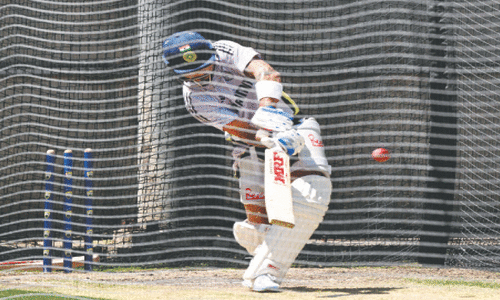LONDON: Who has been the greatest Olympic athlete since ancient Olympia's multi-sports festival was revived in Athens 116 years ago?
The debate was reopened on Tuesday when Michael Phelps anchored the US men's quartet to a sweeping victory in the 4x200 metres freestyle relay at the London Games.
Consequently, Phelps overhauled Soviet gymnast Larisa Latynina's previous record medal tally of 18 to a standing ovation at the London Aquatic Centre.
“Is he the greatest of all time?,” shouted the venue announcer as Phelps and his team mates walked around the pool displaying their gold medals.
Possibly, would be the honest if unsatisfying answer once the euphoria has dissipated.
The Michael Phelps of 2012, the light visibly fading, is not the phenomenon who won a record eight gold medals in Beijing four years ago.
So far he has failed to win an individual gold and also failed to become the first male swimmer to win three successive titles when he finished second in the 200 metres butterfly final earlier in the evening.
Still, at the age of 27 and with three events to come in his fourth Olympics before he retires, he will be the most decorated athlete in Games' history and acknowledged as the best men's swimmer.
Latynina, 77, whose father died in the battle for Stalingrad, hailed from the Ukraine and competed for the Soviet Union in three Olympics, starting in Melbourne in 1956.
She is one of only two women to win the all-around gold twice, a tribute to her versatility of which she remains justly proud.
Phelps has similar advantages to Latynina in the number of events he can enter, primarily the boon of covering the same distance with four different stroke.
Track and field athletes run, throw or jump but rarely combine the two, apart from the men's decathlon and women's heptathlon which are in themselves specialist events.
ULTIMATE ACCOLADE
Two male athletes ran and jumped to Olympic titles in intensely competitive events.
The incomparable Jesse Owens won gold medals in the 100, 200, long jump and 4x100 metres relay at the 1936 Berlin Olympics, a performance replicated by Carl Lewis at the 1984 Los Angeles Games.
Owens had no opportunity to compete in another Games after World War Two started in 1939 and in those amateur days athletes rarely had the means to take part in more than one Olympics.
Lewis competed in four Olympics and such was the purity of his technique that he won the long jump gold in each of them, even though by his final Games in 1996 the speed and elasticity had inevitably diminished.
In an interview with Reuters television on Tuesday, before Phelps had swum, Lewis declined an invitation to comment on what he regarded as his own Olympic legacy.
Instead he outlined the opportunities he had which had been denied to his predecessors.
“I was around when the Olympic Games became modern. If it wasn't for the professionalism of the Olympic Games we wouldn't see people going three or four or five Olympics,” he said.
“I think that's great, especially in my sport. When I came I thought I would maybe go to one Olympics, two at most, because I would have to get a job like my contemporaries.”
Boxing is another elemental if controversial sport, featuring in both the ancient and modern Games, but, apart from the Cubans, its great reputations have been won in the professional arena.
The greatest of these was Muhammad Ali, who won an Olympic gold at the 1960 Rome Games.
Ali, aging and ravaged by the cruel advance of Parkinson's syndrome, appeared at the London Games opening ceremony.
The reception he received was a tribute to the impact he had in the fight for human rights in the 1960s and his dazzling virtuosity in his glorious prime.
Lewis's greatest days came in Olympic stadiums.
Taking into account his achievements over such a long period in two different disciplines, he would win the ultimate accolade as the greatest modern Olympian of all.













































